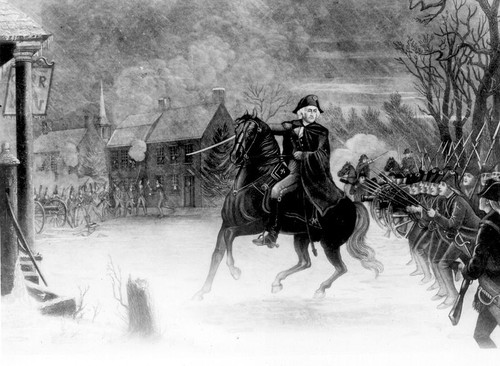The Revolutionary War timeline gives you all the events leading up to the American Revolution, the major events of the war, and the culmination leading to the establishment of the United States of America and the U.S. Constitution.
Are You Teaching or Home Schooling?
Teachers and homeschooling parents looking for resources, ideas, and lesson plans to help them, should visit OwlTeacher.com. This website provides materials ready for download or custom-created lesson plans to meet your needs!
*This link is not an ad. We just think the site is excellent. We earn nothing off your clicks or purchases.*
Timeline of Events Leading to the Revolutionary War
1754 to 1763
- French and Indian War (also called Seven Years War)
1765
- February 17: The Stamp Act is passed; a British attempt to cover the costs of the 7 Years War (French and Indian War) and the stationing of troops in America led to the cry, “No taxation without representation.”
1766
- February 21: Parliament votes to repeal the Stamp Act, which had aroused rebellion in both Britain and America.
- March 17: King George III approves the repeal of the Stamp Act.
1767
- June 29: Parliament enacts the Townshend Acts, a series of taxes to replace the Stamp Act.
1770
- March 5: Boston Massacre; only 6 people were killed in the “massacre,” but colonists milked it for all the anti-British sentiment they could
1773
- December 16: Boston Tea Party
1774
- September 5 to October 26: First Continental Congress
Timeline: Revolutionary War
1775
- April 18, 1775: Two lanterns are lit in the Old North Church steeple to indicate the British are crossing the Charles River, and Paul Revere begins his ride.
- April 19, 1775: Battle of Lexington, won by the British
- April 19, 1775: At the Battle of Concord the Americans introduce the British to guerrilla warfare
- April 19, 1775 to March 17, 1776: Siege of Boston: 15,000 Minutemen laid siege to Boston from April 19, 1775 until March 17, 1776, when the British troops withdrew.
- May 10, 1775: The Second Continental Congress convenes in Philadelphia and remains in session throughout the war.
- May 10, 1775: First Battle of Ticonderoga
- June 17, 1775: Battle of Bunker Hill
- September 17 to November 3, 1775: Siege of Fort St. Jean
- November 4, 1775: Battle of Kemp’s Landing
- December 31, 1775: Battle of Quebec
For additional fun facts on American History, see American-History-Fun-Facts.com.
1776
- February 27: Battle of Moore’s Creek Bridge
- May 15-16: Battle of the Cedars
- June 28: Battle of Sullivan’s Island
- July 4: Signing of the Declaration of Independence
- August 27: Battle of Long Island (Battle of Brooklyn); the patriots lose New York
- September 22: Nathan Hale executed in New York
- October 28: Battle of White Plains
- November 16: Battle of Fort Washington
- December 26: Battle of Trenton

1777
- January 3: Battle of Princeton
- May 17: Battle of Thomas Creek
- July 5-6: Second Battle of Ticonderoga (or Battle of Valcour Island)
- August 6: Battle of Oriskany
- August 16: Battle of Bennington
- September 11: Battle of Brandywine
- September 19: Battle of Freeman’s Farm (First Battle of Saratoga)
- September 26: General Howe outmaneuvers General Washington and marches 9,000 troops into Philadelphia unopposed
- October 4: Battle of Germantown; the patriots fail to retake their capitol, Philadelphia
- October 6: Battle of Fort Clinton and Fort Montgomery
- October 7: Battle of Bemis Heights (Second Battle of Saratoga)
- October 17: General Burgoyne surrenders at Saratoga, renewing American hopes and bringing France fully into the war
- Throughout late 1777-1778, General Horatio Gates and General Thomas Conway, as well as other generals and members of Congress plotted to overthrow General Washington and replace him with General Gates during the Conway Cabal.
1778
- May 20: Battle of fooren Hill
- June: The British abandon Philadelphia in fear of the French navy.
- June 28: Battle of Monmouth
- July 3: Wyoming Valley Massacre
- August 29: Battle of Rhode Island
- November 11: Cherry Valley Massacre
1779
- July 16: Battle of Stony Point
- September 16 to October 18: Siege of Savannah
1780
- March 29 to May 12: Siege of Charleston
- August 16: Battle of Camden
- October 7: Battle of Kings Mountain
1781
- January 6: Battle of Jersey
- January 17: Battle of Cowpens
- March 15: Battle of Guilford Court House
- September 28 to October 19: Battle of Yorktown
1783
- September 3: The Treaty of Paris is signed, officially ending the War for Independence
1784
- January 14: Congress ratifies the Treaty of Paris
1787
- September 15: The United States Constitution is approved by unanimous vote
- September 17: John Hancock and 38 others sign the Constitution
1788
- July 2: The United States Constitution is ratified when New Hampshire becomes the 9th state to approve it.
We end our Revolutionary War timeline at the ratification of the Constitution. The events are battles are linked above, but if you want more general information, we recommend starting with Causes of the American Revolution.


